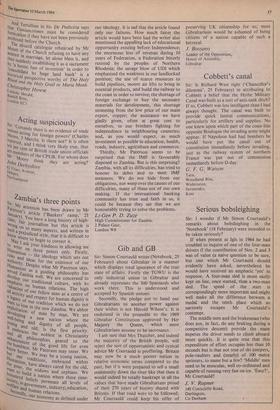Zambia's three points
Sir; my attention has been drawn to Mr ir• AR raterson's article C Januar)). You have a long history of high-
fair Bankers' ramp,' 21_ class fair journalism but this article is
Ong on so many aspects, and written 1 such a prejudiced style, that it is difficult to 'n o‘v where to begin to correct it. , May I ask your kindness in allowing me .,.`° write on
antsirl three points only. Firstly, num •
— the ideology which sets out rules and ideas for the existence of our . pi e what othority, Des vt h t Mr Paterson says, stiornanism as a guiding philosophy has derved Zambia well. We are concerned to evelop our traditional culture, with its eloPhasis on human relations. The high alvailnatio f our fellow man as a centre of a activityand respect for human dignity is :antwan of our tradition which we do not to lose in the new Zambia. We abhor XPloitation aweveloping of man by man. We are beinga new nation Indwhere and dignity of all people, It .°g and old, is the first pricoorpitlye: embraces the noblest in Christianity all philosophies geared to the enhancent of the good life for even know humblest. Mr Paterson may sneer. We brt.now better. We may be a young nation, hut our traditions, embraced within ihuernanism, have always cared for the old, Pc)or, the widows and orphans. We ho..nt to build a nation where these time- Z"(Aired beliefs permeate all levels of it rt ye, n government, industry', education, Secondly our economy as defined under
our ideology. It is sad that the article found only our failures. How much fairer the article would have been had the writer also mentioned the appalling lack of educational opportunity existing before Independence; the enormous loss of revenue during 10 years of Federation, a Federation bitterly resisted by the peoples of Northern Rhodesia; the savage blow of UDI which emphasised the weakness in our landlocked position; the use of scarce resources to build pipelines, mount air lifts to bring in essential products, and build the railway to the coast in order to survive; the shortage of foreign exchange to buy the necessary materials for development, this shortage stemming from the low price of our main export, copper; the assistance we have gladly given, often at great cost to ourselves, to our brothers fighting for independence in neighbouring countries; and, as you would expect, as much investment as possible in education, health, roads, industry, agriculture and commerce.
Thirdly, Mr Paterson seems to be surprised that the IMF is favourably disposed to Zambia. But is this surprising? Zambia, with all its difficulties, has tried to honour its debts and to meet IMF measures. We do not hide from our obligations, nor weep over the causes of our difficulties, many of them not of our own making. If the international banking community has trust and faith in us, it could be because they see that we are honourably trying to solve the problems. Lt-Gen P. D. Zuze
High Commissioner for Zambia, 2 Palace Gate, London W8






































 Previous page
Previous page